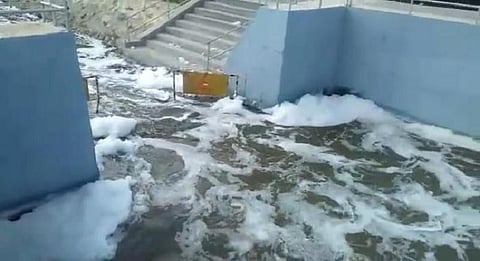

Visuals of frothy and revoltingly unclean water filling up a lake in Kolar had shocked the residents of Bengaluru. The allegedly treated water was released by Bangalore Water Supply and Sewerage Board (BWSSB) from the Sewage Treatment Plants (STPs) in Koramangala-Challaghatta (KC) to the lakes in Kolar. Now, the BWSSB has said that it will start pumping the allegedly treated water in the KC Valley STP to 128 lakes in the Kolar and Chikkaballapura catchment areas, in the next 15 days.
Nithyanand Kumar, BWSSB Chief Engineer-in-charge of STPs, said, “After Karnataka State Pollution Control Board analysed samples of the treated water, it submitted to the High Court on Thursday that the presence of heavy metals in the water was within permissible limits. On Friday, however, the HC ordered us to submit another report detailing the quality of the treated water in the STP within the next 15 days. Though we will submit the second report soon, we will start pumping water into the 128 lakes in the next 15 to 20 days.”
In its submission to the Karnataka High Court, the state government on Thursday said that the quality of treated water supplied as part of the KC Valley Project meets the surface water norms prescribed under the Environment (Protection) Rules of 1986.
A division bench of the High Court, headed by Chief Justice Dinesh Maheshwari, was hearing a public interest litigation (PIL) over the issue, filed by activist Anjaneya Reddy of the Shashwatha Neeravari Horata Samiti from Chikkaballapur. In the petition, Anjaneya argued that the project was taken up without conducting a scientific study and that the treated water supplied via the project contained industrial effluents.
Advocate Uday Holla, appearing for the Karnataka State Pollution Control Board (KSPCB), informed the High Court that the water released under the project was as per norms prescribed under the Environment (Protection) Rules of 1986 and that it was used to recharge the groundwater levels in Kolar and Chikkaballapur, and not for irrigation.
The KSPCB collected test samples on September 16 and analysed them on September 20, and found the pH level of the water to be 7.8, which is within the prescribed 5.5-9 range. The faecal coliform matter was also found to be below the permissible limit of 1600.
The KC Valley Project was inaugurated on June 7. It provides treated water from Sewage Treatment Plants (STPs) in Bellandur to 128 irrigation tanks in Kolar and Chikkaballapur. The project was initiated to solve the water woes of typically dry districts by recharging groundwater levels and making water available for irrigation.
But ever since the project was launched, activists have repeatedly questioned the quality of water transported through the project.
On July 23, the High Court asked the government to stop the supply of partially treated water as part of the project. The decision was taken after residents in Kolar observed that frothy water was being supplied.
The High Court further pulled up the state government for squandering public money on the project and gave it time till September 11 to formulate a response. The court also extended the stay on the project till September 20, asking the government to conduct tests on the treated water samples.
However, the petitioners said that it was unbelievable that the test results of the water samples came back positive as the tests conducted by the Indian Institute of Science (IIS) showed that the water contained large levels of nitrates, cadmium, chromium, lead, zinc and cobalt, which were harmful to human life.
"There was phosphorous content in the water. We suspect it must have been added in the water to create foam after it was released from the STP," Nityanand Kumar said.
In 2017, the Japan International Cooperation Agency (JICA) had conducted a feasibility study for the BWSSB’s proposed projects to provide Cauvery water and sewage connections to the 110 villages within the BBMP limits.
According to the report, “About 60% of generated sewage is treated at existing STPs in Bengaluru. Generated sewage volume is about 20% larger than the capacity of existing STPs and inflow sewage volume is reported at about 70% of the total capacity of the existing STPs. It seems that about 40% of generated sewage are not collected in the service area.”
JICA also conducted a survey of the KC Valley Sewage Treatment Plant and its report stated that the STP was “decrepit” and the equipment required repair. Since the chlorine tank was not functional, the water was not getting cleaned.